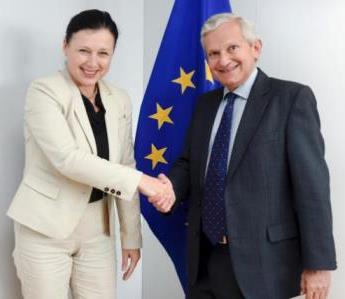
On 22nd September Mr Geoffrey Vos met with Mrs Jourova, the Commissioner for Justice Consumers and Gender Equality.
The President reported on his meeting with the Commissioner, Mrs Jourova which took place on 22 September. One of the issues discussed was the quality of justice. Mrs Jourova agreed that this issue has a significant cultural content that needs to be carefully considered. The Commissioner indicated that she is keen that the ENCJ should continue its cooperation with the EC on the Scoreboard as it moves to consider the quality of justice. She is concerned that the EC should re-think the methodology of the Scoreboard. The President offered ENCJ’s assistance. The commissioner would like to develop indicators of quality. Again, the President indicated that the ENCJ was willing to help, and indeed that was a large part of the ENCJ’s continuation of the independence project in 2015/16.
There was a discussion about the objective and subjective independence of the judiciary. The EC has received criticism because the only subjective views in the Scoreboard had come from business (Figure 47 World Economic Forum). The ENCJ would be happy to assist the EC on the preparation of a new Eurobarometer evaluating consumer confidence in the justice systems of Europe and the independence of those judiciaries.
Towards the end of the meeting, the issue of funding was discussed. Mrs Jourova thinks that the EC’s budget should be directed towards its priorities, and should not be determined in isolation from the determination of those priorities. One of those priorities was to provide a programme for the improvement of the quality of justice across the EU involving training, ethics, and enhancing respect for the judiciary. The ENCJ President suggested that this might bring in the ENCJ’s cooperation with EJTN in relation to training judges across Europe in good practices concerning judicial governance, Councils for the Judiciary, and best practice generally.
The Commissioner asked what she should say when she would visit Ukraine (23/25 September). The President thought that she should make it clear that there was a need for the Councils to be functionally independent so as to be able to combat the problems of judicial corruption. The ENCJ would be pleased to engage with the Ukrainian Councils. The Commissioner also mentioned that she though that as a follow-up to the EU project in Ukraine European internships could be offered to young judges and prosecutors.
A final idea which was raised by the ENCJ was that there might be a brainstorming session between the networks, organised by the EC, to discuss how to improve the quality of justice. The bodies to be involved (not more than 10 people) might include ENCJ, EJTN, ASCP (Supreme Court Presidents), and ACA. The Commissioner thought this was a good idea and suggested as a title “How can the Scoreboard measure (perhaps “and improve”) the quality of justice?”
The meeting concluded with a discussion on the EPPO (European Public Prosecutors Office) and the question of countries that allow “transactions” to buy out the prosecution for a criminal offence. Mrs Jourova is concerned that prosecutors do not understand that the project is not intended to interfere with national prosecution procedures or practices, but is intended to produce another layer to investigate and prosecute EU-fraud and other crimes affecting the Union's financial interests, which is hard to tackle at a national level.
One of the issues that was discussed was the continuation of the cooperation between ENCJ and the Commission on the EU Justice Scoreboard as it moves to consider the quality of justice. Another point of discussion was the need for a programme for the improvement of the quality of justice across the EU involving training, ethics, and enhancing respect for the judiciary. The ENCJ President suggested that this might bring in the ENCJ’s cooperation with EJTN in relation to training judges across Europe in good practices concerning judicial governance, Councils for the Judiciary, and best practice generally.
The meeting concluded with a discussion on the EPPO (European Public Prosecutors Office) and the way forward in relation to the investigation and prosecution of EU-fraud and other crimes affecting the Union's financial interests.
Picture courtesy of the European Union - © European Union, 2015
 On 22nd September Mr Geoffrey Vos met with Mrs Jourova, the Commissioner for Justice Consumers and Gender Equality.
On 22nd September Mr Geoffrey Vos met with Mrs Jourova, the Commissioner for Justice Consumers and Gender Equality.
